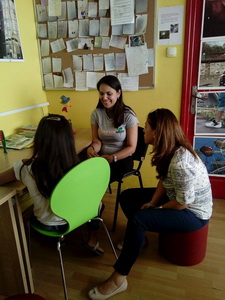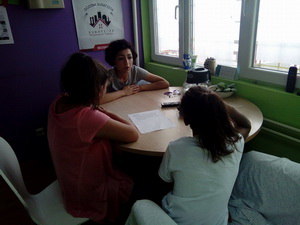 On 28 July 2017, the Social Inclusion and Poverty Reduction Unit of the Government of the Republic of Serbia in cooperation with the Centre for Interactive Pedagogy and the Centre for Youth Integration organised a Living Library in the Shelter for Children and Youth living and/or working on the street.
On 28 July 2017, the Social Inclusion and Poverty Reduction Unit of the Government of the Republic of Serbia in cooperation with the Centre for Interactive Pedagogy and the Centre for Youth Integration organised a Living Library in the Shelter for Children and Youth living and/or working on the street.
The Living Library represents an innovative method in the fight against racism and xenophobia used for promoting human rights and equality. The Living Library functions like any other library – readers can borrow a book for a period of time. The difference is that in the Living Library the books are actually representatives of various vulnerable groups who then speak to the reader about their life experiences.
Within the “Friends of Inclusive Education Network” project, the Centre for Interactive Pedagogy created the Living Library where “books” are actually young Roma boys and girls who share experiences from their school days. Book titles refer to early development, school and what “books” remember from the time they went to school. The Living Library provides the opportunity for readers to talk to the “books” after they have heard their story, and to ask them questions about the story they had the opportunity to hear.
 With this initiative, the Social Inclusion and Poverty Reduction Unit of the Government of the Republic of Serbia aims to contribute to the fight against discrimination, stereotypes and prejudice directed towards the Roma community by sharing life experience of the “books” which sometimes include unpleasant situations faced by Roma students because of their diversity. Living Libraries will also be organised in primary schools and civil society organisations in a number of municipalities in Belgrade. This way, children will be empowered to report every form of discrimination, activists will be encouraged to continue motivating children and developing their personal capacities, while the teachers will build awareness regarding the experience of Roma children with regard to their school life and they will recognise the importance of their treatment of all students, especially those coming from vulnerable groups.
With this initiative, the Social Inclusion and Poverty Reduction Unit of the Government of the Republic of Serbia aims to contribute to the fight against discrimination, stereotypes and prejudice directed towards the Roma community by sharing life experience of the “books” which sometimes include unpleasant situations faced by Roma students because of their diversity. Living Libraries will also be organised in primary schools and civil society organisations in a number of municipalities in Belgrade. This way, children will be empowered to report every form of discrimination, activists will be encouraged to continue motivating children and developing their personal capacities, while the teachers will build awareness regarding the experience of Roma children with regard to their school life and they will recognise the importance of their treatment of all students, especially those coming from vulnerable groups.
 Government of the Republic of Serbia
Government of the Republic of Serbia















 pdf [271 KB]
pdf [271 KB]
Leave a Comment